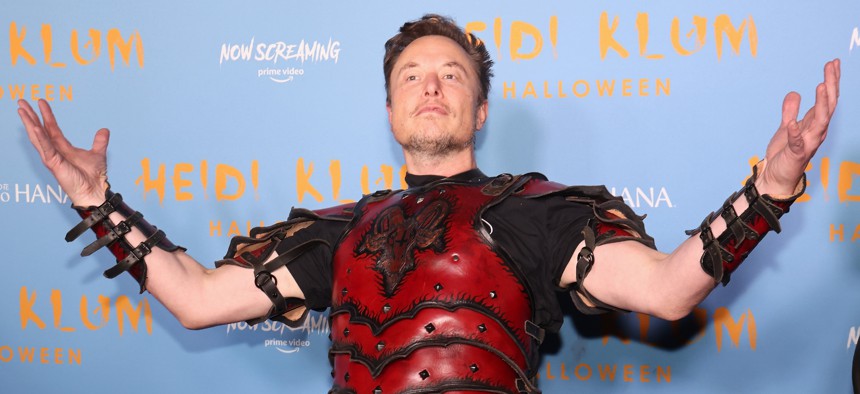Lawmaker, Twitter chief spar over fake account

Twitter CEO Elon Musk attends 2022 Halloween party. Taylor Hill/Getty Images
Should federal agencies with verified Twitter accounts be concerned about rapid changes roiling the social network?
A sitting lawmaker wants to know how a journalist was able to use Twitter's self-service subscription option to create a verified account in his name.
In a Nov. 11 letter, Sen. Ed Markey (D-Mass.) asked Twitter CEO and new owner Elon Musk how a Washington Post reporter was able to set up the account @realedmarkey using the recently launched $8/month subscription option which identified the account as verified.
In the letter, Markey asked Musk to explain the current verification process that results in accounts receiving a verification badge – a white checkmark on a blue background that is widely known as a "blue check." Markey is also seeking clarification on whether the verification of the fake account was done in keeping with Twitter's current policies or not. (Twitter executives appear to have removed the $8/month subscription from its app on Friday, according to press reports.)
"Twitter must explain how this happened and how it will prevent it from happening again," Markey said.
Musk, who completed the $44 billion acquisition of Twitter in October, shot back in a tweet to Markey: “Perhaps it is because your real account sounds like a parody?"
Markey responded by noting that several of Musk's companies have fallen afoul of government regulators and warned that a reckoning could be coming.
"One of your companies is under an FTC consent decree. Auto safety watchdog NHTSA is investigating another for killing people," Markey tweeted. "And you’re spending your time picking fights online. Fix your companies. Or Congress will."
The contentious back-and-forth between Musk and Markey follows a week that saw stock prices of big-name companies see-saw because of fake Twitter accounts posting false information using subscription accounts with the signature checkmark.
Justin Herman, former head of governmentwide social media at the General Services Administration, helped negotiate and implement usage agreements for agencies in the early days of social media. He told FCW that the government is not blameless in what appears to be a looming crisis of trust for the Twitter platform. As social media platforms matured, the government increasingly relied on standard terms of service rather than bespoke agreements that included rules on the presentation of official accounts.
"Gradually, government started losing its seat at the table as one of the entities that advise on the standards of social media platforms," Herman said.
Agencies are supposed to maintain entries of official social media accounts on a GSA-hosted digital registry but Herman noted that it was unlikely that private individuals would resort to such a tool to verify information purporting to come from a U.S. government account.
"We need a hard reset to look at where we are today," Herman said. "When we start losing the trust of the public, there's no point. This isn't the first and it won't be the last time this trust comes into questions – that's why right now agencies need to be looking internally on their policies and procedures for handling incidents when they occur – and the federal government as a whole needs to look at how we are addressing this trust gap with the service itself."
A roster of celebrity users including TV producer Shonda Rimes and singer Toni Braxton have deactivated their accounts in the wake of Musk's acquisition of the service, according to a CBS News report. However, U.S. government agency defections have yet to materialize. The U.S. Consumer Product Safety Commission, which maintains an energetic, meme-filled Twitter account, announced its plans to stick with the service in a tweet.
Agencies need to be thinking about risks posed by Twitter's changing verification policies right now, Herman said. He noted that while rank-and-file federal Twitter users can't dictate policy to the social network, they can change how they deploy their own verified accounts.
"I would not wait for the worst-case scenario situation," Herman said. "I would start asking questions and demanding answers today."
Adam Mazmanian contributed reporting to this article.
NEXT STORY: How the FCC Shields Cellphone Companies From Safety Concerns



